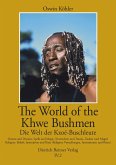Colour is largely assumed to be already in the world, a natural universal that everyone, everywhere understands. Yet cognitive scientists routinely tell us that colour is an illusion, and a private one for each of us; neither social nor material, it is held to be a product of individual brains and eyes rather than an aspect of things. This collection seeks to challenge these assumptions and examine their far-reaching consequences, arguing that colour is about practical involvement in the world, not a finalized set of theories, and getting to know colour is relative to the situation one is in - both ecologically and environmentally. Specialists from the fields of anthropology, psychology, cinematography, art history and linguistics explore the depths of colour in relation to light and movement, memory and landscape, language and narrative, in case studies with an emphasis on Australian First Peoples, but ranging as far afield as Russia and First Nations in British Columbia. What becomes apparent, is not only the complex but important role of colours in socializing the world; but also that the concept of colour only exists in some times and cultures. It should not be forgotten that the Munsell Chart, with its construction of colours as mathematical coordinates of hues, value and chroma, is not an abstraction of universals, as often claimed, but is itself a cultural artefact.
Bitte wählen Sie Ihr Anliegen aus.
Rechnungen
Retourenschein anfordern
Bestellstatus
Storno








